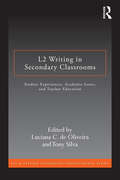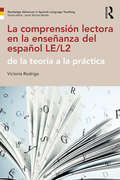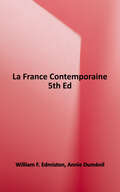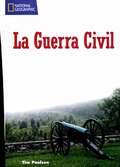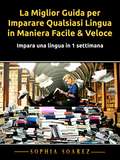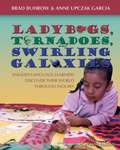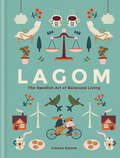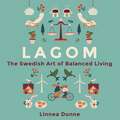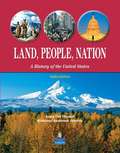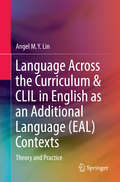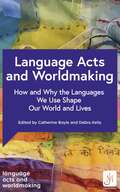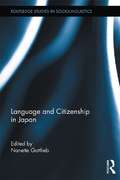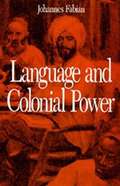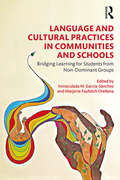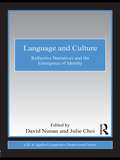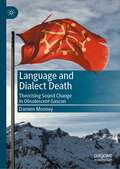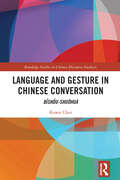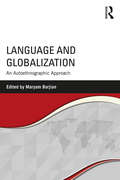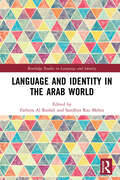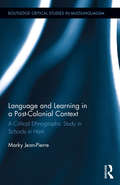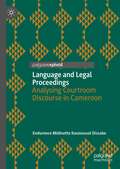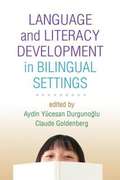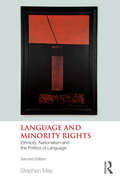- Table View
- List View
L2 Writing in Secondary Classrooms: Student Experiences, Academic Issues, and Teacher Education (ESL & Applied Linguistics Professional Series)
by Luciana C. de Oliveira Tony SilvaSecond language writers and the teaching of writing at the secondary level have received little attention compared with other skills such as reading. Addressing this gap, this volume uniquely looks at both adolescent L2 writing and the preparation of secondary teachers to work with this population of students. Part I, on adolescent L2 writers, includes case studies looking at their literacy identities, their trajectories in mainstream content area classes, and their transition from high school to college. Part II looks at academic issues. The focus in Part III is L2 writing teacher education. Taking a theoretically eclectic approach that can support a variety of pedagogies, this book contributes significantly to understanding adolescent second language writers and to educating teachers to address these students’ specific needs.
La comprensión lectora en la enseñanza del español LE/L2: de la teoría a la práctica
by Victoria RodrigoLa comprensión lectora en la enseñanza del español LE/L2: de la teoría a la práctica presents state-of-the-art theory and teaching practices for integrating reading skills into the teaching of Spanish. The book bridges a conspicuous gap between research supporting reading as a key component of language acquisition and actual practice by discussing how to implement reading successfully in and out of the classroom. Written entirely in Spanish, the book focuses on the needs of Spanish language learners with the goal of motivating students to read in the target language and work with diverse types of texts and genres. Written in a clear and accessible manner, La comprensión lectora en la enseñanza del español LE/L2: de la teoría a la práctica is an essential resource for teachers of Spanish at all levels. It is an excellent reference book for language teachers who wish to integrate reading into the teaching of the Spanish language.
La France Contemporaine
by William Edmiston Annie DumenilImmerse yourself in the France of today with this text, which will improve your understanding of the Francophone world and your communication in French, using up-to-date information on the political, social, technological, economic, and rich cultural forces that affect this fascinating country and its people. End-of-chapter comprehension and discussion activities, sample quizzes, and an integrated companion website help you master the material and fully appreciate everything that makes France French.
La Guerra Civil: Language, Literacy and Vocabulary—Reading Expeditions (EE UU. Historia y Vida) (Language, Literacy, and Vocabulary: Reading Expeditions En Español Series)
by National Geographic LearningLanguage, Literacy & Vocabulary - Reading Expeditions (EE.UU. Historia Y Vida): La Guerra Civil (Language, Literacy, and Vocabulary: Reading Expeditions en espanol)
La Miglior Guida per Imparare Qualsiasi Lingua in Maniera Facile & Veloce: Impara una lingua in 1 settimana
by Sophia SoarezUna guida dettagliata per imparare qualsiasi lingua in modo facile e veloce Questa guida ti aiuterà ad imparare la nuova lingua in 1 settimana e ti insegnerà trucchi e suggerimenti per diventare madrelingua della nuova lingua. Sulla base di fatti scientifici, questo libro ti spiegherà: - il modo più semplice per imparare una nuova lingua - Come impiegare il tuo tempo in modo efficace - Come diventare un madrelingua - Come imparare la corretta pronuncia della nuova lingua - Come posizionare la bocca per una pronuncia corretta - Come memorizzare le parole di una nuova lingua - Come rimanere motivati - Come migliorare l'accento Se vuoi imparare una nuova lingua in una settimana e diventare un madrelingua, allora questo libro fa per te. -> Scorri fino all'inizio della pagina e fai clic su Aggiungi al carrello per acquistare immediatamente Disclaimer: Questo autore e / o il / i proprietario / i dei diritti non fanno rivendicazioni, promesse o garanzie circa l'accuratezza, la completezza o l'adeguatezza dei contenuti di questo libro e declina espressamente la responsabilità per errori e omissioni nei contenuti all'interno di esso. Questo prodotto è solo per riferimento.
Ladybugs, Tornadoes, and Swirling Galaxies: English Language Learners Discover Their World Through Inquiry
by Brad Buhrow Anne Upczak GarciaYou will see how the authors blend comprehension instruction and ELL best practices to explore inquiry as a literacy pathway for English language learners. As teachers and students engage in learning science and social studies content they also discover multiple ways to make meaning. The book is full of photographs of student artwork--including a color insert--that reveals the children's inquiry process, and demonstrates the important role of art as a sign system in ELL literacy and language acquisition. Brad and Anne provide explicit detail on the process they use as they move step-by-step with students from personal narrative through the independent inquiry process. They also discuss use of the Gradual Release Model, authentic assessment, and bilingual identities. Appendices in Spanish and English help to round out this informative and charming resource.
Lagom: The Swedish Art of Balanced Living
by Linnea DunneStep aside Hygge. Lagom is the new Scandi lifestyle trend taking the world by storm. This delightfully illustrated book gives you the lowdown on this transformative approach to life and examines how the lagom ethos has helped boost Sweden to the No.10 ranking in 2017's World Happiness Report. Lagom (pronounced 'lah-gom') has no equivalent in the English language but is loosely translated as 'not too little, not too much, just right'. It is widely believed that the word comes from the Viking term 'laget om', for when a mug of mead was passed around a circle and there was just enough for everyone to get a sip. But while the anecdote may hit the nail on the head, the true etymology of the word points to an old form of the word 'lag', which means 'law'.Far from restrictive, lagom is a liberating concept, praising the idea that anything more than 'just enough' is a waste of time. Crucially it also comes with a selflessness and core belief of responsibility and common good. By living lagom you can: Live a happier and more balanced life Reduce your environmental impact Improve your work-life balance Free your home from clutter Enjoy good food the Swedish way Grow your own and learn to forage Cherish the relationships with those you love
Lagom: The Swedish Art of Balanced Living
by Linnea DunneDiscover the Swedish ethos of balanced living with Lagom.Lagom (pronounced 'lar-gom') has no equivalent in the English language but is loosely translated as 'not too little, not too much, just right'. It is widely believed that the word comes from the Viking term 'laget om', for when a mug of mead was passed around a circle and there was just enough for everyone to get a sip. But while the anecdote may hit the nail on the head, the true etymology of the word points to an old form of the word 'lag', which means 'law'.Far from restrictive, lagom is a liberating concept, praising the idea that anything more that 'just enough' is a waste of time. Crucially it also comes with a selflessness and core belief of responsibility and common good. By living lagom you can live a happier and more balanced life, reduce your environmental impact, improve your work-life balance, free your home from clutter, enjoy good food the Swedish way, grow your own and learn to forage, and cherish the relationships with those you love.Linnea Dunne was born and raised in Sweden, where she started her writing career as a columnist at the local newspaper aged 15. She left for Ireland a few years later and eventually moved to London, where she studied Creative Writing and Political Communications. She now lives in Dublin with her husband and two half-Swedish kids, trying to achieve that lagom balance against all odds. Linnea's work on subjects ranging from motherhood to women's rights and media narratives has been published by (among others) the Irish Times, the Guardian and the Irish Independent, and she also works as Editor of Scan Magazine. The irony of the fact that she escaped her home country, never made it back, and now spends the majority of her day writing about Scandinavian culture, innovation and trends is lost on no one.(P) 2017 Octopus Publishing Group
Land, People, Nation: A History of the United States (3rd Edition)
by Anna Uhl Chamot Kathleen Anderson SteevesLand, People, Nation: A History of the United States helps English language learners and struggling readers develop academic language skills for learning history and geography. The engaging readings and illustrations, maps, charts, and graphs build valuable interpretive skills for students as they master academic content.
Language Across the Curriculum & CLIL in English as an Additional Language (EAL) Contexts
by Angel M. Y. LinThis book will be of interest to a broad readership, regardless of whether they have a background in sociolinguistics, functional linguistics or genre theories. It presents an accessible "meta-language" (i. e. a language for talking about language) that is workable and usable for teachers and researchers from both language and content backgrounds, thus facilitating collaboration across content and language subject panels. Chapters 1 to 3 lay the theoretical foundation of this common meta-language by critically reviewing, systematically presenting and integrating key theoretical resources for teachers and researchers in this field. In turn, Chapters 4 to 7 focus on issues in pedagogy and assessment, and on school-based approaches to LAC and CLIL, drawing on both research studies and the experiences of front-line teachers and school administrators. Chapter 8 provides a critical and reflexive angle on the field by asking difficult questions regarding how LAC and CLIL are often situated in contexts characterized by inequality of access to the linguistic and cultural capitals, where the local languages of the students are usually neglected or viewed unfavourably in relation to the L2 in mainstream society, and where teachers are usually positioned as recipients of knowledge rather than makers of knowledge. In closing, Chapter 9 reviews the state of the art in the field and proposes directions for future inquiry.
Language Acts and Worldmaking: How and Why the Languages We Use Shape Our World and Our Lives
byCollectively authored by the Language Acts and Worldmaking team, this defining volume offers reflective narratives on research, theory and practice over the course of the flagship project of the same name, funded by the Arts and Humanities Research Council's Open World Research Initiative. It returns to the project's key principles - that our words make worlds and we are agents in worldmaking - analyses the practices and outcomes of collaborative working, and looks to the future by offering concrete ideas for how the work they have done can now continue to do its work in the world.Focusing on the key research strands, this volume looks at the role of the language teacher as a mediator between languages and cultures, worldmaking in modern languages, translation and the imagination, languages and hospitality, digital mediations, and how words change and make worlds. Critically, it analyses the impact on communities of living in multilingual cities, and the ways in which learning a first language, and then a second, and so on, plays a crucial role in our ability to understand our culture in relation to others and to appreciate the ways in which they are intertwined.Specific aims are to: · propose new ways of bridging the gaps between those who teach and research languages and those who learn and use them in everyday contexts from the professional to the personal · put research into the hands of wider audiences · share a philosophy, policy and practice of language teaching and learning which turns research into action · provide the research, experience and data to enable informed debates on current issues and attitudes in language learning, teaching and research · share knowledge across and within all levels and experiences of language learning and teaching · showcase exciting new work that derives from different types of community activity and is of practical relevance to its audiences · disseminate new research in languages that engages with diverse communities of language practitioners.
Language Acts and Worldmaking: How and Why the Languages We Use Shape Our World and Our Lives
byCollectively authored by the Language Acts and Worldmaking team, this defining volume offers reflective narratives on research, theory and practice over the course of the flagship project of the same name, funded by the Arts and Humanities Research Council's Open World Research Initiative. It returns to the project's key principles - that our words make worlds and we are agents in worldmaking - analyses the practices and outcomes of collaborative working, and looks to the future by offering concrete ideas for how the work they have done can now continue to do its work in the world.Focusing on the key research strands, this volume looks at the role of the language teacher as a mediator between languages and cultures, worldmaking in modern languages, translation and the imagination, languages and hospitality, digital mediations, and how words change and make worlds. Critically, it analyses the impact on communities of living in multilingual cities, and the ways in which learning a first language, and then a second, and so on, plays a crucial role in our ability to understand our culture in relation to others and to appreciate the ways in which they are intertwined.Specific aims are to: · propose new ways of bridging the gaps between those who teach and research languages and those who learn and use them in everyday contexts from the professional to the personal · put research into the hands of wider audiences · share a philosophy, policy and practice of language teaching and learning which turns research into action · provide the research, experience and data to enable informed debates on current issues and attitudes in language learning, teaching and research · share knowledge across and within all levels and experiences of language learning and teaching · showcase exciting new work that derives from different types of community activity and is of practical relevance to its audiences · disseminate new research in languages that engages with diverse communities of language practitioners.
Language and Citizenship in Japan (Routledge Studies in Sociolinguistics)
by Nanette GottliebThe relationship between language and citizenship in Japan has traditionally been regarded as a fixed tripartite: ‘Japanese citizenship’ means ‘Japanese ethnicity,’ which in turn means ‘Japanese as one’s first language.’ Historically, most non-Japanese who have chosen to take out citizenship have been members of the ‘oldcomer’ Chinese and Korean communities, born and raised in Japan. But this is changing: the last three decades have seen an influx of ‘newcomer’ economic migrants from a wide range of countries, many of whom choose to stay. The likelihood that they will apply for citizenship, to access the benefits it confers, means that citizenship and ethnicity can no longer be assumed to be synonyms in Japan. This is an important change for national discourse on cohesive communities. This book’s chapters discuss discourses, educational practices, and local linguistic practices which call into question the accepted view of the language-citizenship nexus in lived contexts of both existing Japanese citizens and potential future citizens. Through an examination of key themes relating both to newcomers and to an older group of citizens whose language practices have been shaped by historical forces, these essays highlight the fluid relationship of language and citizenship in the Japanese context.
Language and Colonial Power: The Appropriation of Swahili in the Former Belgian Congo, 1880-1938
by Johannes FabianAmong the preconditions for establishing colonial authority was communication with the colonised. Verbal exchanges depended on a shared communicative praxis providing common ground on which unilateral claims could be imposed. Use of, and control over, verbal means of communication were needed to maintain regimes - military, religious-ideological, economic - in power. In the Belgian Congo brutal physical force never ceased to be exercised. In this study Professor Fabian examines the more subtle uses of power through controls on communication, by looking at the history of Swahili as it spread from the East Coast to Central Africa and demonstrating connections between -changing forms of colonial power and the development of policies towards Swahili. Using a wide range of sources, including numerous and sometimes obscure vocabularies, he combines concepts derived from literary theory and sociolinguistics to uncover, through the flaws and failures of these texts, deep-seated attitudes to language and communication.
Language and Cultural Practices in Communities and Schools: Bridging Learning for Students from Non-Dominant Groups
by Inmaculada M. García-Sánchez Marjorie Faulstich OrellanaDrawing on sociocultural theories of learning, this book examines how the everyday language practices and cultural funds of knowledge of youth from non-dominant or minoritized groups can be used as centerpoints for classroom learning in ways that help all students both to sustain and expand their cultural and linguistic repertoires while developing skills that are valued in formal schooling. Bringing together a group of ethnographically grounded scholars working in diverse local contexts, this volume identifies how these language practices and cultural funds of knowledge can be used as generative points of continuity and productively expanded on in schools for successful and inclusive learning. Ideal for students and researchers in teaching, learning, language education, literacy, and multicultural education, as well as teachers at all stages of their career, this book contributes to research on culturally and linguistically sustaining practices by offering original teaching methods and a range of ways of connecting cultural competencies to learning across subject matters and disciplines.
Language and Culture: Reflective Narratives and the Emergence of Identity (ESL & Applied Linguistics Professional Series)
by David NunanThis state-of-the-art exploration of language, culture, and identity is orchestrated through prominent scholars’ and teachers’ narratives, each weaving together three elements: a personal account based on one or more memorable or critical incidents that occurred in the course of learning or using a second or foreign language; an interpretation of the incidents highlighting their impact in terms of culture, identity, and language; the connections between the experiences and observations of the author and existing literature on language, culture and identity. What makes this book stand out is the way in which authors meld traditional ‘academic’ approaches to inquiry with their own personalized voices. This opens a window on different ways of viewing and doing research in Applied Linguistics and TESOL. What gives the book its power is the compelling nature of the narratives themselves. Telling stories is a fundamental way of representing and making sense of the human condition. These stories unpack, in an accessible but rigorous fashion, complex socio-cultural constructs of culture, identity, the self and other, and reflexivity, and offer a way into these constructs for teachers, teachers in preparation and neophyte researchers. Contributors from around the world give the book broad and international appeal.
Language and Dialect Death: Theorising Sound Change in Obsolescent Gascon
by Damien MooneyThis book offers a systematic acoustic phonetic analysis of both language and dialect death in the region of Béarn, southwestern France. Focusing on Béarnais, a localised dialect of Gascon which is under pressure from French, the author explores the socio-political process of language shift, whereby members of a speech community cease to speak their indigenous language in favour of an incoming dominant language. Gascon is at an advanced stage of this process, making its remaining speakers excellent candidates for the study of language obsolescence, and this unique study will be of interest to researchers working in a broad range of disciplines, including language variation and change, language and dialect contact, Occitan and French, sociophonetics and phonology.
Language and Gesture in Chinese Conversation: Bǐshǒu-shuōhuà (Routledge Studies in Chinese Discourse Analysis)
by Kawai ChuiLanguage and Gesture in Chinese Conversation is a study of the semantic and temporal relationships between the speech and the gesture in the context of discourse interaction in Mandarin Chinese spoken in Taiwan. The cross-modal representation of ideas in natural discourse reveals the nature of BĬSHŎU-SHUŌHUÀ in the communication of meaning. The study addresses two central issues: • How do language and gesture represent the semantic information of various types of ideas? • How do the linguistic representation and gestural depiction pattern temporally in the communication of cross-modal information? The intended audience of this book are scholars in many academic fields, including linguistics, language and gesture, human communication, cognition, cognitive neuroscience, social psychology, sociology, linguistic anthropology, speech pathology, and speech therapy.
Language and Globalization: An Autoethnographic Approach
by Maryam BorjianIn this collection of real-life, personal narratives on the theme of language and globalization, scholars from a range of different sub-disciplines of linguistics, time periods, and geographical spaces throughout the world examine the interaction and intersectionality of languages and globalization and the implications of such interactions for world languages and cultures. A feature of the book is the application of autoethnography as its underlying approach/method, in which contributors draw on their own lived experiences (of life, scholarship, and work) to investigate and reflect on linguistic globalization and its issues and challenges against the backdrop of the globalized world of the 21st century.
Language and Identity in the Arab World (Routledge Studies in Language and Identity)
by Fathiya Al Rashdi Sandhya Rao MehtaLanguage and Identity in the Arab World explores the inextricable link between language and identity, referring particularly to the Arab world. Spanning Indonesia to the United States, the Arab world is here imagined as a continually changing one, with the Arab diaspora asserting its linguistic identity across the world. Crucial questions on transforming linguistic landscapes, the role and implications of migration, and the impact of technology on language use are explored by established and emerging scholars in the field of applied and socio-linguistics. The book asks such crucial questions as how language contact affects or transforms identity, how language reflects changing identities among migrant communities, and how language choices contribute to identity construction in social media. As well as appreciating the breadth and scope of the Arab world, this anthology focuses on the transformative role of language within indigenous and migrant communities as they negotiate between their heritage languages and those spoken by the wider society. Investigating the ways in which identity continues to be imagined and re-constructed in and among Arab communities, this book is indispensable to students, teachers, and anyone who is interested in language contact, linguistic landscapes, and minority language retention as well as the intersections of language and technology.
Language and Learning in a Post-Colonial Context: A Critical Ethnographic Study in Schools in Haiti (Routledge Critical Studies in Multilingualism)
by Marky Jean-PierreThis book explores the social, political, and historical forces that mediate language ideology and practices in post-colonial education and how such ideology and practices influence students’ academic achievement. Jean-Pierre provides empirical evidence that a relationship exists between language practices and school underperformance. He takes Haiti as the focus of study, finding that students and teachers experience difficulty constructing knowledge in a setting in which the language they speak at home (Creole) differs from the language of instruction (French). The research is based on ethnographic data collected in classrooms in both private and public school settings in addition to different sectors of the society (e.g. state and private institutions).
Language and Legal Proceedings: Analysing Courtroom Discourse in Cameroon
by Endurence Midinette DissakeThis book investigates language-related problems which arise in courtroom discourse in the Republic of Cameroon, in Central Africa. While Cameroon has over 250 national languages, court cases are conducted in the two official languages: English and French. This is despite the fact that 40% of the adult population is illiterate in these languages, and means that lay litigants often encounter language-related problems during trials. In this study, the author makes use of Speech Act Theory and Interactional Sociolinguistics to analyse the speech acts of both legal professionals and lay litigants as observed in 37 legal cases, demonstrating how the use of exoglossic languages in a highly multilingual nation constitutes a serious issue. The book will be of interest to students and scholars of Forensic Linguistics, Language Policy and Planning, and Discourse Analysis, particularly those with an interest in the African context.
Language and linguistic contact in ancient Sicily
by Olga Tribulato"Within the field of ancient bilingualism, Sicily represents a unique terrain for analysis as a result of its incredibly rich linguistic history, in which 'colonial' languages belonging to branches as diverse as Italic (Oscan and Latin), Greek and Semitic (Phoenician) interacted with the languages of the natives (the elusive Sicel, Sicanian and Elymian). The result of this ancient melting-pot was a culture characterised by 'postcolonial' features such as ethnic hybridity, multilingualism and artistic and literary experimentation. While Greek soon emerged as the leading language, dominating official communication and literature, epigraphic sources and indirect evidence show that the minority languages held their ground down to the fifth century BCE, and in some cases beyond. The first two parts of the volume discuss these languages and their interaction with Greek, while the third part focuses on the sociolinguistic revolution brought about by the arrival of the Romans"--
Language and Literacy Development in Bilingual Settings
by Claude Goldenberg Aydin DurgunogluGrounded in state-of-the-art research, this book explores how English language learners develop both the oral language and literacy skills necessary for school success. Chapters examine the cognitive bases of English acquisition, and how the process is different for children from alphabetic (such as Spanish) and nonalphabetic (such as Chinese) language backgrounds. The book addresses a key challenge facing educators and clinicians identifying students whose poor English skills may indicate an underlying impairment, as opposed to still-developing language proficiency. Implications for diagnosis, intervention, and instruction are highlighted throughout.
Language and Minority Rights: Ethnicity, Nationalism and the Politics of Language (Language In Social Life Ser.)
by Stephen MayThe second edition addresses new theoretical and empirical developments since its initial publication, including the burgeoning influence of globalization and the relentless rise of English as the current world language. May’s broad position, however, remains largely unchanged. He argues that the causes of many of the language-based conflicts in the world today still lie with the nation-state and its preoccupation with establishing a 'common' language and culture via mass education. The solution, he suggests, is to rethink nation-states in more culturally and linguistically plural ways while avoiding, at the same time, essentializing the language-identity link. This edition, like the first, adopts a wide interdisciplinary framework, drawing on sociolinguistics, applied linguistics, sociology, political theory, education and law. It also includes new discussions of cosmopolitanism, globalization, the role of English, and language and mobility, highlighting the ongoing difficulties faced by minority language speakers in the world today.
